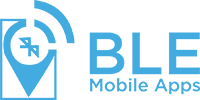Blockchain: The Ultimate Game Changer for IoT Security
- by BLE Mobile Apps

“Blockchain technology is the missing link to settle scalability, privacy, and reliability concerns
in the Internet-of-Things.”
Blockchain technology and IoT are the two buzz words which grabs attention at every corner of the world, no matter on which part of the web you are navigating. But truly, it is worth hype!!! Isn’t it? With millions of inter-connected device via internet, security and management is always a distress. It is natural that, servers would become overloaded and represents a single point of failure, making the system vulnerable to cyber-attack. The sole solution to this issue is Blockchain technology. The improvisations in the IoT devices in terms of the security facilitate faster adoption which bounds to open up a wide range of opportunities for the enterprises in near future.
But what is Blockchain all about?
We share information through Internet almost every day but when we talk about assets like money, stocks, property etc. we tend to rely on third party like banks, government, social media etc. This third-party carries out business transactions for us which are centralized and can be hacked anytime. Is it reliable?
So, what if there is distributed ledger called Blockchain which can be shared and synchronized across the network, multiple sites, geographies etc.? It is a technology used in Bitcoin where all the digital transactions are recorder as blocks by miners in the network who holds the gigantic computing skills. It is decentralized and the blocks are time-stamped and no central authority is involved. To be precise, it is a distributed database which holds all the records of transactions in a network which cannot be hacked.
Two main types of Blockchain
- Public Blockchain: Everyone can read or write data. So, Blockchain limits them to provide the access of just reading or writing. For instance, Bitcoin uses an approach where anyone can write
- Private Blockchain: All participants are known and trusted. It helps when it is used between the companies that belong to the same legal mother entity.
Advantages
- Scaled security for IoT: Blockchain stores and retrieves the information in millions and billions of connected devices with the decentralized technology. Hence, it provides low latency and high throughput. Blockchain acceptance in the IoT space can revolutionize the approach where IoT edge devices exchange data in encoding transactions, while protecting data exchanges and ensuring security of all devices involved.
- Reduces Cost: Communication, data exchanges and device information are conducted on peer-to-peer basis removing protocols and hardware. No third party is involved which results into time-saving procedure and reduction of cost.
- Builds Trust: IoT Blockchain facilitates devices to interact as trusted parties. While device A may not know device B, and may not believe it verifiably, the permanent record of exchanges and information from devices stored on the Blockchain confirm and enable the vital trust for organizations, individuals, and devices to cooperate.
When IoT meets Blockchain
- The Blockchain nullifies the security and privacy issues in Internet of Things because the cryptography used in this technology will ensure the privacy in maintaining the customer’s data. IoT devices can be embedded with the digital identities and digital signatures where devices will have unique ID.
- It will enable the smart devices to function autonomously and the history of the devices will be stored as absolute record in Blockchain.
- For instance, a truck fleet with sensors carrying a frozen ice-cream can recognize the temperature variation and the information are posted on the fleet provider Blockchain immediately. Notification will be sent to all people involved (driver, supplier, fleet provider) in fleet-management. The driver can straight away take an action to secure the trouble.
The optimum platform
Mounting solutions for the Internet of Things requires cooperation, synchronization, and connectivity for each object in the ecosystem. Every device must be integrated with all other devices, and all devices must communicate flawlessly with connected systems. It’s likely, but it can be pricey, time-consuming and difficult.
The optimum platform for IoT can:
- Obtain and deal with data to generate a standards, scalable, and secure platform.
- Integrate and protect information to decrease cost and complications.
- Scrutinize data by extracting business value and then acting on it.
As systems interrelate with each other, it’s necessary to have a decided interoperability standard, which is safe and valid. Without a solid bottom-top structure more threats are created with every device added to the IoT. Blockchain technology is an attractive option when it comes to the security for IoT.
Check Out a Few of the Related Posts Mentioned Below:
- Building Internet of Things (IoT) with Raspberry Pi
- Top Internet of Things (IoT) Trends to Watch Out For In 2018
- How Internet of Things (IoT) Can Improve Your Business
- IoT Security – Making Internet of Things Safe
- Developing Sustainable IoT Mobile Apps for Connecting World
- Bluetooth 5 and The Internet of Things
- How IoT is Changing the World
- Using IoT to Offer Enhanced Customer Experience
